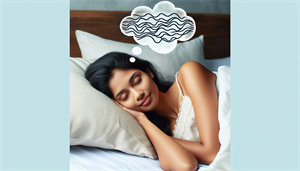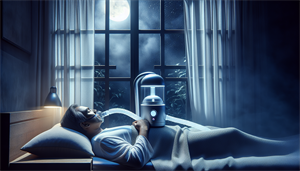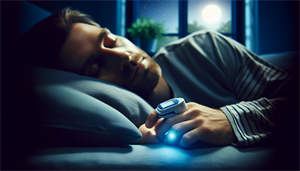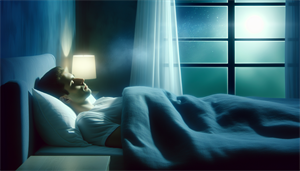Imagine the feeling of waking up feeling exhausted, even after a full night’s sleep. For individuals living with sleep apnea, this is a common reality. The condition, known as obstructive sleep apnea and mental health, is a sleep disorder that affects millions of people worldwide.
But did you know that this sleep disorder can also significantly impact mental health?
In fact, sleep apnea is intricately linked with several mental health conditions, and understanding this connection is crucial for both diagnosis and treatment.
Key Takeaways
-
Sleep apnea significantly impacts mental health, contributing to mood swings, anxiety, depressive symptoms, and exacerbation of existing mental health disorders.
-
Effective treatment of sleep apnea, such as CPAP therapy and lifestyle changes, can lead to the alleviation of mental health symptoms associated with the condition.
-
Identifying and treating sleep apnea in individuals with psychiatric disorders, including bipolar disorder and PTSD, is crucial for improved mental health outcomes and overall well-being.
The Impact of Sleep Apnea on Mental Health

Sleep apnea, specifically obstructive sleep apnea, is a prevalent sleep disorder characterized by repeated episodes of breathing cessation during sleep. This sleep disordered breathing can lead to sleep deprivation, which in turn can have severe consequences on both physical health and mental health.
Indeed, the impact of sleep apnea on mental health is significant and multifaceted. Sleep apnea patients often experience mood swings, anxiety disorders, and depressive symptoms, which can complicate the diagnosis and treatment of this sleep disorder. Moreover, untreated sleep apnea can exacerbate existing mental health disorders, thus creating a vicious cycle that negatively affects the overall well-being of affected individuals.
Hence, grasping the link between sleep apnea and mental health paves the way towards enhanced treatment for sleep apnea and improved overall mental health care. This is where sleep medicine, and in particular the j clin sleep med, has an important role to play: by shedding light on the complex relationship between sleep apnea and mental health, it can guide both healthcare professionals and patients towards more effective management strategies.
Depression and Sleep Apnea
One of the most significant links between sleep apnea and mental health is the connection with depression. Depression is a common psychiatric disorder that affects millions of people worldwide, leading to significant distress and impairment. Numerous studies have found a strong correlation between sleep apnea and major depressive disorder.
Depression is common in sleep apnea patients, with frequencies ranging from 17.6% to 35%. This correlation suggests that the sleep disturbances associated with sleep apnea can significantly contribute to the development and exacerbation of depressive symptoms. Consequently, sleep apnea patients are at an increased risk of developing depression and other mood disorders.
Yet, hope is not lost. Alleviation of depressive symptoms has been observed through successful treatment of sleep apnea. This is a significant finding because it implies that effective sleep apnea treatment can contribute to better mental health outcomes and reduce the burden of depression.
However, the mechanisms connecting obstructive sleep apnea syndrome to depression remain uncertain, and it is unclear whether there are shared pathways linking the two conditions. This uncertainty underscores the need for further research into the connections between sleep apnea and depression.
Despite these hurdles, it is evident that the link between sleep apnea and depression is robust. Hence, identification and remediation of sleep apnea can play a pivotal role in handling depression and boosting overall mental health.
Anxiety and Sleep Apnea
Another common mental health condition associated with sleep apnea is anxiety. Just like depression, anxiety can be a consequence of sleep deprivation induced by sleep apnea. Sleep apnea patients often report symptoms of anxiety, including:
-
Insomnia
-
Fatigue
-
Loud and frequent snoring
-
Gasping or choking during sleep
-
Excessive daytime sleepiness
-
Difficulty concentrating
-
Headaches
-
Dry mouth
However, it’s important to note that anxiety induced by adult obstructive sleep apnea is not the same as other types of anxiety. Both can disrupt sleep patterns, cause distress, and make it difficult to focus during the day. However, the physiological effects specifically related to sleep apnea can also contribute to anxiety levels.
The physiological effects of severe obstructive sleep apnea can contribute to anxiety, and in turn, sleep anxiety can often exacerbate sleep apnea, creating a worsening cycle. This cycle can lead to a significant decrease in the quality of sleep, further exacerbating anxiety symptoms and hindering overall mental health.
The good news is that effective management of sleep apnea can contribute to the reduction of anxiety symptoms. As with depression, treating sleep apnea can improve overall mental health conditions, leading to better quality of life and decreased mental distress.
Evidently, comprehending the bidirectional relationship between anxiety and sleep apnea is essential for efficacious treatment. By addressing the sleep disorder, we can also alleviate the anxiety symptoms, leading to improved mental health and overall well-being.
ADHD and Sleep Apnea
Beyond anxiety and depression, sleep apnea can also cause symptoms similar to attention deficit hyperactivity disorder (ADHD) in adults. ADHD is characterized by problems with attention, hyperactivity, and impulsivity. Adults with sleep apnea may display behavioral issues resembling those seen in ADHD, such as trouble concentrating, impulsiveness, and hyperactivity.
Interestingly, the connection between ADHD-like symptoms and sleep apnea is linked to the quality of sleep. Poor sleep quality, a common symptom of sleep apnea, can lead to difficulties in:
-
attention and concentration
-
impulsivity
-
hyperactivity
-
irritability
-
forgetfulness
-
mood swings
These symptoms are commonly associated with ADHD.
The good news is that addressing sleep apnea can help alleviate these symptoms. Continuous Positive Airway Pressure (CPAP) therapy, a widely used treatment in sleep medicine, can improve the quality of sleep, potentially alleviating some of the behavioral issues resembling ADHD.
This implies that remediation of sleep apnea can aid in mitigating symptoms akin to adult ADHD. It further underscores the substantial influence of sleep apnea on mental health, emphasizing the need for accurate diagnosis and treatment.
In conclusion, the connection between sleep apnea and ADHD-like symptoms further illustrates the intricate relationship between sleep disorders and mental health. It highlights the importance of considering sleep apnea as a potential factor when diagnosing and treating ADHD-like symptoms in adults.
The Importance of Treating Sleep Apnea for Mental Health

Given the substantial effect of sleep apnea on mental health, it’s evident that addressing this sleep disorder is vital for enhancing mental health results. Whether it’s depression, anxiety, or ADHD-like symptoms, addressing sleep apnea can help alleviate these mental health conditions and enhance overall well-being.
The predominant method for managing sleep apnea is AutoPAP therapy, which automatically adjusts air pressure for the patient. However, another widely used treatment option is Continuous Positive Airway Pressure (CPAP) therapy, which uses a machine to administer continuous pressurized air through a mask, effectively keeping the airway open during sleep.
In addition to these treatments, certain lifestyle adjustments can aid in the management of sleep apnea. These include:
-
Weight loss
-
Increased physical activity
-
Cessation of alcohol and tobacco use
-
Avoidance of certain medications
-
Adjustments to sleep patterns
These modifications can have a positive impact on overall mental health.
Continuous Positive Airway Pressure (CPAP) Therapy
Continuous Positive Airway Pressure (CPAP) therapy is a widely used method for addressing sleep apnea. It has been shown to enhance mental well-being through the promotion of improved sleep quality.
CPAP therapy works by administering pressurized air through the airway using tubing and a mask. This assists the individual in breathing and controlling breathing patterns during sleep, thereby preventing the cessation of breathing that characterizes sleep apnea.
The benefits of CPAP therapy are numerous. It can enhance sleep quality by:
-
Decreasing daytime sleepiness
-
Delivering a complete correction for sleep apnea
-
Enhancing mood and overall quality of life
-
Promoting better sleep continuity
-
Decreasing stage 1 sleep
-
Enhancing rapid eye movement (REM) sleep
-
Minimizing machine noise
-
Facilitating uninterrupted, higher-quality sleep.
Hence, CPAP therapy encompasses more than just remediation for sleep apnea. It’s an all-inclusive strategy that tackles both the physical manifestations of sleep apnea and the correlated mental health problems. By improving sleep quality, CPAP therapy can contribute to better mental health and overall quality of life.
In conclusion, CPAP therapy is a promising treatment option for sleep apnea that can significantly improve mental health outcomes. By addressing the underlying sleep disorder, it can help alleviate mental health conditions associated with sleep apnea and contribute to better overall well-being.
Lifestyle Changes

In addition to medical treatments like CPAP therapy, lifestyle changes can also play a crucial role in managing sleep apnea and improving mental health. One such change is weight loss. Research has demonstrated that weight loss can lead to an improvement in sleep apnea symptoms, as evidenced by a 31 percent enhancement in sleep apnea scores observed in studies. Additionally, reducing tongue fat through weight loss has been associated with better sleep apnea outcomes.
Dietary modifications can also contribute to the management of sleep apnea. Implementing a well-rounded dietary plan can enhance dietary quality and reduce the likelihood of obesity, a factor associated with sleep apnea. Some dietary modifications that can help manage sleep apnea include:
-
Including whole foods, fruits and vegetables
-
Drinking green tea
-
Consuming honey
-
Eating melatonin-rich foods
On the other hand, it is important to avoid high-sugar diets, as they can worsen sleep apnea symptoms. By making these dietary changes, you can play a role in effectively managing sleep apnea.
Another essential lifestyle change is the cessation of smoking. Individuals with sleep apnea should avoid smoking because it can worsen their symptoms by causing chronic inflammation in the upper airway, as well as increasing insomnia and irritability, which can exacerbate the overall condition.
Hence, lifestyle modifications provide a supportive approach alongside medical treatments for managing sleep apnea. By incorporating weight loss, dietary modifications, and smoking cessation, individuals with sleep apnea can not only manage their sleep disorder but also improve their overall mental health.
In conclusion, lifestyle changes play an essential role in the management of sleep apnea and the improvement of mental health. They offer a holistic approach that complements medical treatments and promotes overall well-being.
Sleep Apnea and Psychiatric Disorders: A Closer Look
Beyond its impact on depression, anxiety, and ADHD-like symptoms, sleep apnea is also associated with various psychiatric disorders. Two such disorders are bipolar disorder and Posttraumatic Stress Disorder (PTSD).
For individuals with chronic psychiatric disorders such as Major Depressive Disorder (MDD) and PTSD, the severity of the dysfunction can lead to a feed-forward process with probable outcomes like metabolic syndrome, CNS dysregulation, and OSA. Furthermore, studies reveal that the relationship between psychiatric disorder severity and the presence and severity of OSA is impacted by whether current episodes or lifetime diagnoses are considered.
The predominant intervention for sleep apnea in individuals with schizophrenia and psychotic disorders involves CPAP therapy combined with existing psychiatric medications. This approach has shown to enhance symptoms like excessive daytime sleepiness and negative psychotic symptoms. However, the prevalence studies have shown a significant risk of bias, diverse study designs, and subjective use of psychiatric and OSA diagnostic criteria.
Bipolar Disorder and Sleep Apnea
Bipolar disorder, a mental health condition characterized by extreme mood swings, is one of the psychiatric disorders linked to sleep apnea. Treating sleep apnea can contribute to the stabilization of mood swings in individuals with bipolar disorder.
The association between bipolar disorder and sleep apnea is significant, with a prevalence of sleep apnea in bipolar disorder patients that can be found in Table S6 of the source section. This connection suggests that the sleep disturbances associated with sleep apnea can significantly contribute to the development and exacerbation of bipolar disorder.
The implications of this connection are significant. For individuals living with bipolar disorder, the sleep disturbances caused by sleep apnea can exacerbate their symptoms. It can lead to more frequent and severe mood swings, making it more difficult to manage their condition.
However, the good news is that treating sleep apnea can help manage these symptoms. By addressing the underlying sleep disorder, healthcare professionals can help stabilize mood swings and improve overall mental health outcomes for individuals with bipolar disorder.
In conclusion, the connection between bipolar disorder and sleep apnea is a significant aspect of the overall relationship between sleep disorders and mental health. Recognizing and addressing this connection is crucial for effectively treating both conditions and improving the quality of life for individuals with bipolar disorder.
PTSD and Sleep Apnea
PTSD is another psychiatric disorder that is intricately linked with sleep apnea. Posttraumatic Stress Disorder (PTSD) is a mental health condition that can develop after a person has experienced a traumatic event. People with PTSD often suffer from nightmares, flashbacks, and severe anxiety.
There is a higher prevalence of sleep apnea in individuals with PTSD. The median prevalence of Obstructive Sleep Apnea (OSA) in PTSD was determined to be 42.7% in clinic-based populations. This high prevalence indicates a significant overlap between the two conditions, suggesting that individuals with PTSD are at an increased risk of developing sleep apnea.
The good news is that there are effective treatments available for managing sleep apnea in individuals with PTSD. For instance, CPAP compliance has been observed to decrease the frequency of nightmares in PTSD patients. This highlights the importance of recognizing and treating sleep apnea in individuals with PTSD.
Therefore, understanding the connection between PTSD and sleep apnea is crucial for effective treatment. By addressing the sleep disorder, healthcare professionals can also alleviate the symptoms of PTSD, leading to improved mental health and overall well-being.
In conclusion, the connection between PTSD and sleep apnea further illustrates the intricate relationship between sleep disorders and mental health. It highlights the importance of considering sleep apnea as a potential factor when diagnosing and treating PTSD.
Identifying Sleep Apnea in Mental Health Patients
Considering the substantial effect of sleep apnea on mental health, it’s vital to detect this sleep disorder in patients with mental health issues. Recognizing sleep apnea in these patients can ensure appropriate treatment and enhance mental health outcomes.
Undiagnosed sleep apnea can lead to various symptoms such as:
-
Daytime fatigue
-
Decreased energy levels and motivation
-
Impaired concentration and cognitive function
-
Reduced libido
-
Frequent nighttime awakenings
These symptoms may initially resemble those of depression, but could be more accurately attributed to undiagnosed sleep apnea.
The protocol for diagnosing sleep apnea in mental health patients involves a comprehensive medical assessment to eliminate treatable conditions, such as sleep apnea. Screening instruments are employed to identify sleep apnea in mental health patients, taking into account the similarity of symptoms.
Sleep Apnea Symptoms

Identifying the manifestations of sleep apnea is the initial step towards diagnosis and treatment. Sleep apnea is often identified by a range of symptoms including:
-
low energy
-
daytime fatigue
-
snoring
-
hypertension
-
frequent nighttime urination
-
morning headaches
These indicators should be discussed with a healthcare professional for proper evaluation and diagnosis.
However, sleep apnea can also result in lesser-known symptoms including:
-
Night sweats
-
Frequent awakenings
-
Teeth grinding
-
Depression
-
Fatigue
-
Insomnia
-
Cognitive difficulties
-
Impotence
-
Uncontrolled high blood pressure
-
Nocturia
-
Unrefreshing sleep
-
Heartburn
Morning headaches in individuals with sleep apnea often stem from oxygen deprivation during periods of breathing cessation. This is one of the many ways that sleep apnea can disrupt a person’s daily life and contribute to poor mental health.
Recognizing these symptoms is crucial for the diagnosis and treatment of sleep apnea. By identifying these signs, healthcare professionals can guide their patients towards effective treatment options and help them achieve better sleep and improved mental health.
In conclusion, understanding the wide range of symptoms associated with sleep apnea is crucial for its diagnosis and treatment. Recognizing these signs can help identify individuals who may benefit from sleep apnea treatment, leading to improved sleep quality and overall mental health.
Screening for Sleep Apnea in Mental Health Care
Conducting sleep apnea screenings in mental healthcare environments is a key strategy in pinpointing patients who could gain from sleep apnea treatment. The preferred method for diagnosing sleep apnea is polysomnography (PSG).
However, because sleep apnea and mental health conditions often share similar symptoms, it’s crucial to use specific screening instruments that can accurately identify sleep apnea. These instruments take into account factors like body mass index and sleep patterns, along with symptoms of sleep apnea.
The process of screening for sleep apnea in mental health care settings typically involves using questionnaires to inquire about sleep apnea symptoms and clinical factors. Polysomnography (PSG) is suggested for diagnostic testing.
The benefits of screening for sleep apnea in mental health care settings are significant. By identifying patients who may have sleep apnea, healthcare professionals can:
-
Guide them towards effective treatment options
-
Improve their sleep quality
-
Reduce symptoms of mental health conditions
-
Achieve overall better health outcomes.
In conclusion, screening for sleep apnea in mental health care settings is a crucial component of comprehensive mental health care. By identifying and treating sleep apnea, healthcare professionals can enhance mental health outcomes and improve the quality of life for their patients.
Summary
Sleep apnea is a prevalent sleep disorder with significant implications for mental health. From depression and anxiety to ADHD-like symptoms and other psychiatric disorders like bipolar disorder and PTSD, the impact of sleep apnea on mental health is far-reaching. However, with proper diagnosis and treatment, including CPAP therapy and lifestyle changes, the symptoms of sleep apnea and associated mental health conditions can be managed effectively. Recognizing and treating sleep apnea in mental health patients is crucial for enhancing mental health outcomes and overall well-being.
Frequently Asked Questions
What is the average age of death for sleep apnea?
The average age of death for sleep apnea is around 62 to 66 years, with some variability based on the severity of the condition. This shows the potential impact of sleep apnea on mortality.
Can sleep apnea cause altered mental status?
Yes, sleep apnea can cause altered mental status, including cognitive deficits and psychiatric manifestations such as depression and psychosis (Abstract, date N/A).
How does sleep apnea affect the brain?
Sleep apnea can affect the brain by causing repetitive breathing pauses during sleep, which can lead to a lack of oxygen and potentially result in brain damage, leading to memory problems, difficulty concentrating, and moodiness.
What happens if you let sleep apnea go untreated?
Untreated sleep apnea can lead to serious health issues like type 2 diabetes, strokes, heart attacks, and a shortened lifespan. It's important to seek treatment to avoid these risks.
How is sleep apnea treated?
Sleep apnea is treated using methods like CPAP therapy, which administers continuous pressurized air through a mask to keep the airway open during sleep. Lifestyle changes, such as weight loss and quitting smoking, can also help manage sleep apnea.


